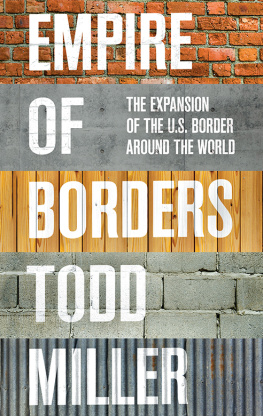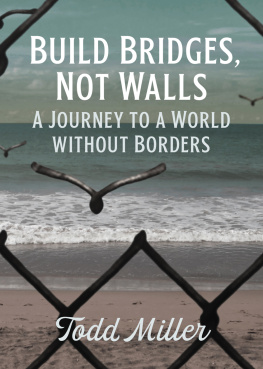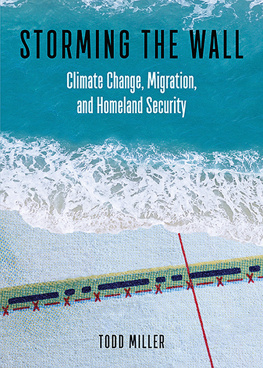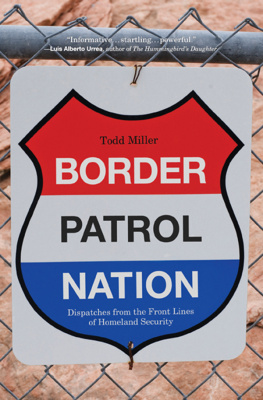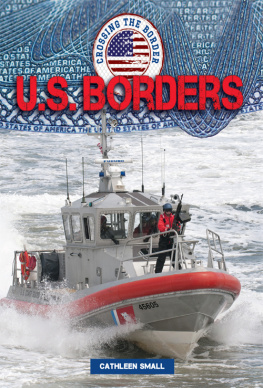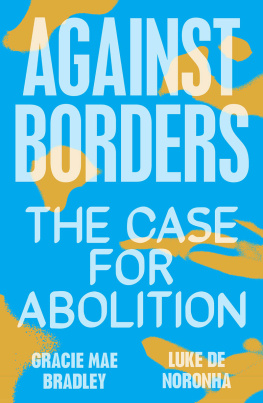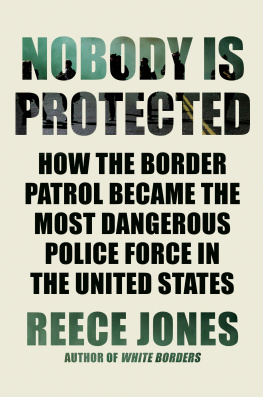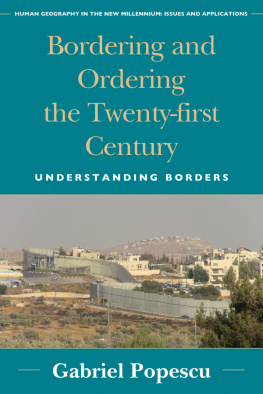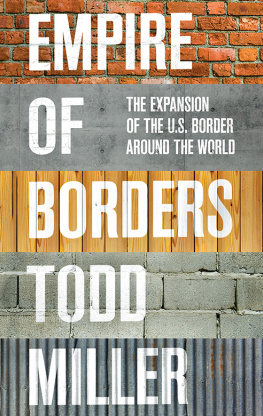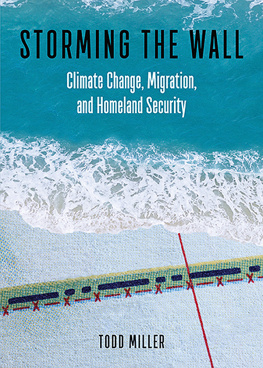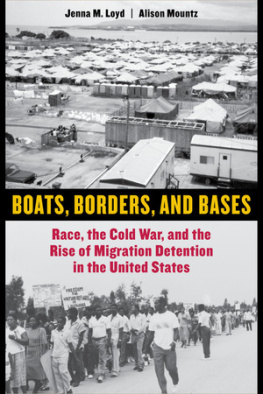Contents

EMPIRE OF BORDERS
EMPIRE OF
BORDERS
The Expansion of the US Border
around the World
Todd Miller

First published by Verso 2019
Todd Miller 2019
All rights reserved
The moral rights of the author have been asserted
1 3 5 7 9 10 8 6 4 2
Verso
UK: 6 Meard Street, London W1F 0EG
US: 20 Jay Street, Suite 1010, Brooklyn, NY 11201
versobooks.com
Verso is the imprint of New Left Books
ISBN-13: 978-1-78478-511-6
ISBN-13: 978-1-78478-513-0 (UK EBK)
ISBN-13: 978-1-78478-514-7 (US EBK)
British Library Cataloguing in Publication Data
A catalogue record for this book is available from the British Library
Library of Congress Cataloging-in-Publication Data
A catalog record for this book is available from the Library of Congress
Typeset in Minion Pro by MJ & N Gavan, Truro, Cornwall
Printed and bound by CPI Group (UK) Ltd, Croydon, CR0 4YY
For Sofia, Memito, and Lauren.
Names are only the guests of reality, the Chinese sage Hsu Yu noted in 2300 BCE, suggesting that borders are little more than collective mythsfictions that a certain number of people, for a certain period of time, believe are fact.
Kate Harris
Contents
We arrived at the Guatemalan military base in Zacapa on a hot morning in early June. In the front there was a closed gate guarded by soldiers in green jungle camouflage and floppy hats, cradling automatic weapons. Zacapa, one of 22 department capitals in the country, sits in the eastern borderlands with Honduras. Its name comes from Nahuatl; it means river of grass. From Zacapa, if you wanted to go to Brownsville, Texasthe closest point in the United Statesyoud travel almost 1,440 miles overland, mostly up Mexicos Gulf Coast highway. But if you wanted to see the U.S. border, you wouldnt need to travel at all; it has already come to this small city in Guatemala. Thats why I was there.
I had come with fellow researcher and photojournalist Jeff Abbott to meet with the Chorti task force, Guatemalas new border patrol, but I wasnt at all sure they would let us in. We were two hours late. Luckily, the soldierswho looked as if they were in their late teensheard me out. I explained the 200-mile journey wed taken to get to Zacapa from San Pedro Sula, where wed been the day before. I told them that the buses in Honduras didnt run at night and the bus driver this morning decided to have a 45-minute breakfast (I was wary about adding this last detail because, really, how could I blame him? But I had to build my case). I told them about the delay at the international border. They nodded because they knew. They knew what it was to travel, to move, to migrate, especially across international bordersso fraught with difficulties, including an endless string of checkpoints. At the Zacapa base, I wondered if any of the soldiers who stood before me, someone perhaps from one of Guatemalas many poor communities, would be permitted entry into the United States. I wondered how many had tried.
Indeed, the vast majority of humans on the planet are prohibited from crossing international boundaries. Most people, including in the United States, do not have passports. If you do have one and you are from the United States, United Kingdom, France, or Germanyamong several other countriesyou can freely travel to approximately 160 countries without a visa. However, if you dont have a visa and are from Iraq or Afghanistan, doors will be slammed shut in all but approximately thirty. write immigration experts Jane Guskin and David L. Wilson.
Although a bustling international airport might seem to tell another story, according to the educated guess of a former director of the Safety, Air Transport Association, only six percent of the worlds population boards an airplane in any given year.
We live in a world of the included and the excluded, of those who can vacation (and do business) where they please and those who are walled in by borders and armed guards. And many of those armed guards, as was clearly the case with the soldiers at the Zacapa base, would themselves be prevented from crossing a good percentage of the globes political borders.
In Zacapa, we waited while one of the soldiers made phone calls. We tried to find shade under the corrugated metal roof overhanging the front gate. From where we stood there was a view of a parched mountain, with Segunda Brigada de Infanteria C.G.R.C. (Second Infantry Brigade) inscribed on the ground on the side of the mountain, in large white letters amid bushes and small, shrubby trees under what looked like a cell tower. The military base was in the Central American dry corridora long swath of territory that extended into Honduras, El Salvador, Nicaragua, and as far as Panamaand at this very moment, in June 2015, they were experiencing a historic drought. For small farmers in the region, the drought was going to eat away harvests, leaving hunger in a place that climate scientist Chris Castro called ground zero for climate change in the Americas. Not only has the planets earth-altering era of climate change, which some call the Anthropocene, been a gut punch to a place like Guatemala, its gone hand in hand with an unprecedented thrust in border militarization across the globe. Long-term forecasts have predicted that ecological upheavals are going to drive unparalleled levels of human migration. I had plenty of time to think about all this while we waited for permission.
Finally the soldier making the calls returned. Are you with BORTAC?
I was stunned. Had I heard him correctly?
There was only one possible way that the soldier could have known about BORTACthe U.S. Border Patrol special forces and tactical unit. Agents of BORTAC must have stood at this gate before. Even in the United States, very few people knew about BORTACs SWAT-style operations in the U.S. borderlands, or about its global response capacity. Fewer still were aware that BORTAC had conducted training and operations both in the United States and in other countries in furtherance of the U.S. Border Patrols mission.
No, I said, looking down at my wrinkled, half-tucked shirt. BORTAC agents were the U.S. Border Patrols robocops. They had to do rigorous physical testing involving sit-ups, push-ups, pull-ups; 1.5-mile runs; and pistol qualification. The training was designed to mirror aspects of the U.S. Special Operation Forces selection courses.
BORTAC has played a big part in pushing out the U.S. borders abroad. It supported U.S. military actions such as Operation Enduring Freedom in Afghanistan and Operation Iraqi Freedom. BORTAC agents trained the Iraqi border police and its tactical team from 2006 to 2011, serving as advisors and working alongside Iraqi border patrol in the field. Clearly, this was a critical mission, said the magazine Tactical Life, because the Iraqi Border Police are responsible for preventing smugglers, insurgents, weapons, or the money needed to fund terrorist organizations from entering their country.
In Iraq, U.S. boundary-building efforts began even before BORTACs arrival, in 2004, with an operation labeled Phantom Linebacker in which 15,000 Iraqi border guards were trained to patrol inas the name of the operation indicatesthe spirit of American football. BORTACs operations were hardly limited to Iraq: They had extended around the globe to places like Jordan, Afghanistan, Colombia, Haiti, Peru, Panama, Belize, Mexico, Kenya, Costa Rica, Ukraine, Kosovo, Argentina, Honduras, Ecuador, Armenia, Tajikistan, and, of course, Guatemala.

